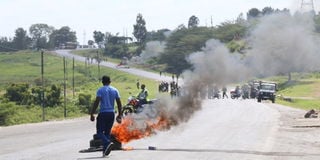New report: 26 police-linked killings recorded in Nakuru since 2020

A protester walks past a bonfire lit along Nakuru-Kabarak road during protests on June 10,2025.
A man was shot dead on June 9 over an alleged bribery dispute involving the police. This becomes the latest victim in what appears to be a persistent pattern of extrajudicial killings in Nakuru county.
The latest incident adds to a grim record of deaths and disappearances attributed to security forces, painting a worrying picture of police impunity and unchecked violence.
A review of data from the Missing Voices coalition reveals that at least 26 people have died under suspicious circumstances involving police officers in the county since 2020. These deaths include shootings, torture, and enforced disappearances.
The county's track record shows that in 2020, nine people were reportedly killed or went missing in suspected extrajudicial incidents out of a total national tally of 168 such cases. The majority of these victims remain unidentified, as their causes of death were not fully established.
The next year, four cases were recorded even as the national tally rose to 219 with three of these involved in shootings and one torture case.
Among the victims was a senior police sergeant who was also shot.
The situation worsened in 2022, which saw an increase with 13 reported killings out of a national total of 153 cases.
Of the 26 victims, 18 were male, three were female, and five remain unidentified. The mean age among those whose ages are known was approximately twenty-five years, with several of the victims in their teens or early twenties.
Human rights groups say Monday's killing exemplifies a crisis they've been documenting for years raising serious questions about accountability and justice in the county.
David Kuria, executive director of the Nakuru Human Rights Network and IMLU's regional monitor, says they have institutional data for 2023 to date, with additional cases linked to the Kenya Wildlife Service (KWS).
“In 2023, we received cases of three people who died - two during the protests over the cost of living and one in police custody. About 10 cases were reported in 2024, with some of them linked to KWS, Gen Z protests, and police custody. This year, five people have died linked to police, Kenya Forest Service, and KWS,” Kuria says.
He expresses frustration with the limitations facing human rights organizations and the slow pace of justice in these cases.
“We've only been able to push for justice, but we don't have authority to investigate despite reluctance by the Independent Policing Oversight Authority (IPOA), saying that they are backed up with many cases,” Kuria said.
He criticizes government agencies for failing to act promptly, accusing them of being compromised.
“Justice has been slow, with every government agency responsible dragging their feet. We call on them to stop the extrajudicial killings and for IPOA to wake up because most cases involving police are dragging, and we are wondering if it's state capture.”
“Even when a case gets to court, it still drags. Investigators are not doing their work and are also not assisting Kenyans to get justice. Cases fail to progress because we believe victims are being compromised, or they don't follow up anymore with cases dying before reaching court. But when there's pressure, like in the case of Brian Odhiambo, there's progress. We are calling for justice for these people,” Kuria adds.
On his part, Nakuru West MP Samuel Arama condemned the killing, saying this is not the first time police have illegally killed someone in his constituency.
“We wouldn't have had this incident if we used the available local authorities. This happened years back and I condemn this happening again," Arama said expressing frustration.


